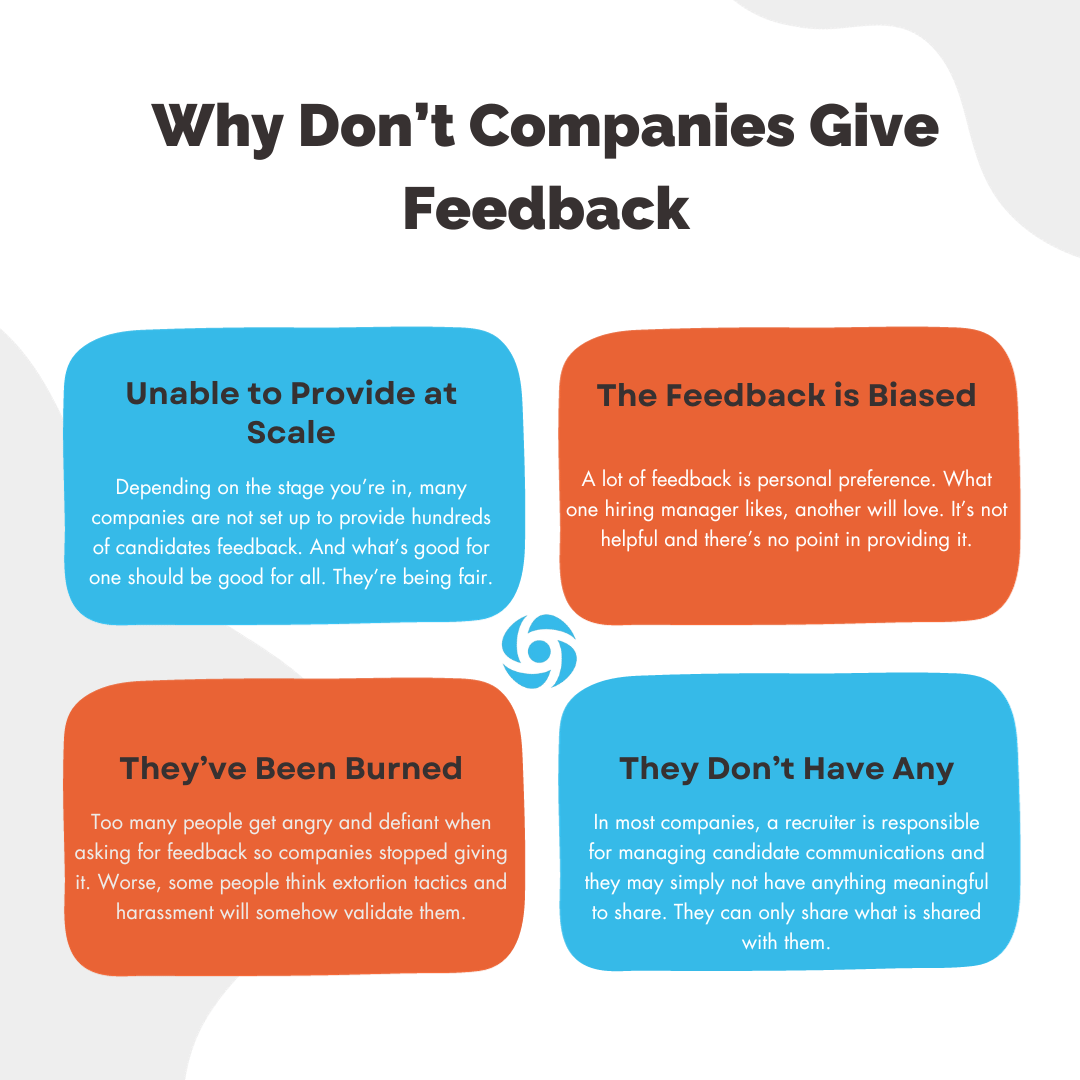How to Ask For Feedback After Job Rejection
If you really want to rile job seekers up, talk about feedback (or the lack thereof) after a rejection email or phone call. It’s a contentious topic that frustrates recruiters and job seekers alike. Should you even bother asking? Even if you get feedback, is it helpful?
Today I’m going to tackle some of these questions and more. We’ll discuss:
Is it worth asking for feedback?
Why many companies don’t give feedback.
When you should ask for feedback.
Who you should ask for feedback.
How you should ask for feedback.
What not to do when asking for feedback.
How to use the feedback you’ve been given.
And, I’ll include some sample emails and talk tracks you can use to request feedback that counts.
Should You Ask For Feedback After Job Rejection
The house seems divided on this question. Some recruiters will tell you that it’s not worth it. Others will say ask every time. While I don’t have any statistics on how often companies actually give feedback to candidates after a rejection email, my guess is that it’s low, less than 30% most likely.
Those who argue in favor of asking for feedback usually cite these three reasons:
To learn and grow,
To keep the door open with the employer for future opportunities, and
To find closure.
I tend to agree with the first one, but not the latter two. Here’s why.
You can still get closure without feedback. Especially when you realize that the majority of the time the feedback you receive won’t be helpful. Closure comes by simply being notified that you didn’t get the job or that you won’t be moving forward. You have closure. It’s over for this job at this moment.
You also don’t need to ask for feedback to keep the door open with an employer. If you handled yourself well, trust me, the door will stay open.
So back to number, one, learning and growing. I think we can be more specific. I like to think the sole purpose of asking for feedback is to identify potential skill gaps that you are unaware of.
Those skills may be technical or knowledge-based in nature, or they could be transferable skills such as how you delivered your message in an interview or your resume. Notice that I didn’t include traits because changing traits for an employer is always a recipe for disaster later.
Related Article: Transferable Skills vs Technical Skills vs Traits
So, should you ask for feedback after being rejected? Yes, why not? What’s the worst that can happen? Nothing. And if nothing happens, you’ll be in the same place you are right now.
If you do decide to ask for feedback, ask without expectation. As I’ll discuss in the next section, there are some good reasons that companies may not give you feedback. Keep your expectations real.
Even if you choose not to ask for feedback, always respond to an email or voicemail. It’s the professional thing to do and it gives you another opportunity to show your character and leave an impression.
Two things I’ve learned in my recruiting career - things always change and people always lie. The person who accepted the job offer may change their mind or another opening may come up. You never know what is going on behind the scenes, so take every opportunity to show who you are.
Why Don’t Companies Give Interview Feedback
I know, it’s super frustrating not knowing why you were eliminated from a job. It’s even more frustrating when you get some vague piece of feedback that is simply unworkable and unhelpful.
I’ve worked with hundreds of companies and it is a fact the policy of many organizations not to provide feedback. Here are some reasons why.
Unable to Provide Meaningful Feedback at Scale
Depending on what stage of the hiring process you were rejected, there may be hundreds (if not thousands for some jobs) of others applying for the same job. If an employer gave feedback to one, they would have to give feedback to everyone and that simply isn’t workable for many companies.
It’s different if you were one of three finalists for a job. But if you are rejected in the early stages of recruitment, it’s hard to do more than a generic (usually automated) response.
The Recruiter Doesn’t Have Much More Information Than You Do
In many organizations, a recruiter is responsible for all candidate communications. In fact, I find it rare that a candidate ever has a direct line to the actual decision maker or hiring manager for a job (even after an interview).
Unless you can obtain feedback from the source (the hiring manager), it’s almost impossible to receive anything meaningful.
Related Article: Hiring Manager vs. Recruiter [Who Does What and How To Interact With Both]
The Feedback is Biased
If you’ve been job searching for any length of time and have been fortunate to receive some feedback, you’ll quickly notice this observation. What one person says is a strength, another will say is a weakness. Every piece of feedback is biased and you can’t please everyone. While one manager may want you to bring Disneyland energy to their team, another would find that a huge turnoff.
Employers Have Been Burned
For those of us old enough to remember when companies tried to give feedback, we also remember all the candidates who would get angry and defiant. Some would send email after email or make call after call, almost harassing recruiters and managers, to change their minds or tell them why they were wrong.
Worse yet, some would perform borderline extortion with threatening emails to sue the employer over the feedback if they didn’t get what they wanted. And yes, this is illegal, but it happens.
So employers reacted and stopped providing feedback out of legal concerns and simply not wanting to be harassed.
It’s Not Their Job
I really do believe that it is not a recruiter or hiring manager’s job to provide feedback on resumes or interview skills. In fact, in some organizations, the policy dictates that their job is NOT to provide these services to candidates.
If you feel like something is holding you back, work with a qualified resume writer or career coach to help you assess what is happening. This is not a shameless advertisement either. If you need help, find the people who specialize in that area.
If you’re being rejected before the interview stages, ask a resume writer to review your resume. If you’re being rejected during the interview stages, ask a coach to interview you and help you identify areas of concern that you’re not seeing yet.
When to Ask for Feedback
Part of getting feedback after being rejected for a job is asking at the right time. Here’s how to know when the time is right for you.
Ask When After You’ve Processed Emotions
The short answer is to ask for feedback as soon as you can and when you have your emotions under control. It’s natural to feel saddened and dejected. Take a beat if you need it.
Everyone is different, so I can’t tell you to ask within 24 hours or 2 hours or anything else. For some, you’ll be able to respond to the rejection within minutes. For others, it may be hours. And for some, it may take days.
The important thing is that you can be level-headed when asking for feedback. Take however much time you need for that.
Ask as Soon as Possible
With that being said, you’re more likely to get a response as soon as you’ve received the email or phone call telling you that you won’t be getting the job. If you can catch the recruiter or manager before they’ve moved on to other things, the likelihood of receiving feedback increases slightly.
This is why being prepared and knowing how to handle the question and conversation become incredibly important. Don’t worry, we’re about to get into this next.
Why People Who Say to Wait Are Wrong
Some coaches suggest that candidates don’t ask right away because it will catch the recruiter or manager off guard and make them feel uncomfortable. These folks must have never recruited before at scale. Trust me, everyone is uncomfortable already. No one likes to deliver bad news. If you ask the right way, it won’t make anyone feel less uncomfortable.
Still, other coaches will advise you to wait because it gives the person more time to collect their thoughts. This is probably the dumbest reason I’ve ever heard. Believe me, no one is collecting more thoughts about you over the next few days.
In fact, you’d be surprised how many hiring managers don’t even remember your name after a day or two has passed. They are incredibly busy and hiring is usually not the center of their world. I know it sounds harsh, but it’s true. If they have any feedback to give, they’re going to give it to you now when you’re fresh on their mind. They won’t go home and think about what feedback to give you over the next two days.
Almost everyone I know is prepared for the feedback question when they call or email to reject you for a job. They aren’t scrambling to come up with reasons. They’ve already made up their mind for those reasons. That’s why you were rejected. They either have valid reasons or they don’t. They will either share them with you now or they won’t. Nothing is changing in two days. At that point, they’ve moved on.
I’ve even heard some say you will sound desperate or panicked if you respond too quickly. The truth is if you handle it correctly and your emotions aren’t raging out of control, you’ll be fine.
If the rejection comes in the form of an email, respond as soon as you can.
If the rejection comes by phone and you answer it, ask on that phone call if you can collect yourself to do so.
If you are rejected on a voicemail, call them back as soon as you are able.
If you’re not mentally prepared to ask for feedback, wait until you are. If
Who to Ask for Feedback
This is a tricky question because ideally, you’d want feedback from the person who made the decision, the hiring manager. However, most of the time this isn’t possible. In most organizations, recruiters are responsible for delivering job rejections. Most of the time you won’t have the hiring manager’s contact information. Sometimes you won’t even know who they are.
In most situations, you’ll ask the recruiter for feedback.
If the hiring manager reached out to you directly, that is an exception where it would be acceptable to ask them for feedback.
I would never advise going around a recruiter to try and get feedback from a hiring manager otherwise. If the hiring manager wanted to communicate with you, they would have.
How to Ask for Meaningful Feedback
Asking questions like, “Why wasn’t I hired,” or “Was I qualified for the job,” or “I thought I was a perfect fit” won’t help you get meaningful feedback. Statements like this are too confrontational. So here are some tips on how to ask for feedback.
Ask for the Right Reasons
The first step is really to ask for the right reasons. You should be genuinely asking for information about skills and experiences that you need to improve on to compete in the job market. The job market is fluid meaning that the skills and experiences that may land you a job today may not be enough next year or even next month.
The laws of supply and demand are always at work. So don’t assume that feedback from last month will be the same as feedback two months from now.
Thank Them
Always start with a thank you. When someone does something they should, like let you know your status as a candidate (even if it’s a rejection), you should always say thank you. Sadly, getting an email that you’re no longer being considered isn’t always the norm.
Thank them for following up with you on the status of the opening and your candidacy.
Make Them Feel Comfortable With You
I’m not going to hide it. I’ve bent the rules for people I like. You probably have too. Even in no-feedback situations, I’ve given feedback before when I felt comfortable with the individual. I’ve even gotten information from previous employers who don’t normally give out inside information about past employees by making them feel comfortable with me.
Now it’s important to realize that if you haven’t made the other person feel comfortable at this point, you’re probably not going to in one email or one phone call. This is an effort of cumulative interactions.
But by letting someone know your true intentions and connecting with them on a human level, you do increase your odds. I like to open with something along the lines of:
“Look Cindy, professional to professional, what can you tell me about the other candidates in terms of what experiences and skills they had more of than myself? I’m asking because I need to know those things so I can find ways to make myself more marketable in the future, whether to future openings you may have or with other companies.”
The more professional you are, the greater the chance of getting useful feedback.
Be Honest About Your Feelings, But Be Brief
Be honest about your feelings; it shows your human side. It’s okay to express disappointment in a professional way that doesn’t make others feel awkward or bad about your loss. It can also show that you’re genuinely interested in working with their company should they have more openings.
One time it took me a year and two rejections to get hired at a company I really wanted to work for. Part of my success was them knowing how genuinely interested I was at working there and my unrelenting pursuit of a job with them.
You could say something like:
“While I’m obviously bummed that you’ve chosen to move forward with other candidates…”
Give Them an Exit
Asking for feedback is going to be awkward for everyone. Even most managers I’ve worked with don’t have great skills at delivering feedback to their employees, let alone candidates. They may not be comfortable giving any feedback at all. Giving them an exit to back into will help make things less awkward.
If you’re speaking with a recruiter you could say something like:
“I know you don’t always get a lot of feedback that you can share from managers, but anything you can share with me on skills or experiences that others may have had more of would be really helpful as I continue to pursue a career as a Compliance Analyst.”
Or if you’re speaking directly to the manager:
“I know you may not be permitted to share much…”
Statements like these give the other person an exit in the event that they can’t share feedback with you and it will help them feel more comfortable in the conversation.
Keep It Positive
Try to avoid asking directly what went wrong or what they didn’t like. Keep it positive and try to avoid subjective things such as what they didn’t like. What they didn’t like, someone else may find your best quality.
Instead, focus on what skills or experiences others had more of than you. This will lead you to identify what skills and experiences you can work on building to make yourself more marketable.
Pause on the Phone
If you answered the phone to receive the news that you’re no longer being considered for a job, don’t be afraid of silence. After you ask for feedback, there is usually a pause. The recruiter or manager may take a minute to think and you’ve already finished your sentence.
Most people don’t do well with silence and so they keep talking. Do your best to refrain from doing this. Silence is your friend. Once you’ve made your ask, pause and wait for them to speak.
Be Ready to Take Notes
I’d be willing to bet that the majority of the time you ask for feedback, you won’t receive anything that can be helpful to your job search or career plan. However, that doesn’t mean you won’t get useful feedback sometimes.
Be prepared to take notes in the event someone does give you valuable insight. You don’t want to be scrambling for a word document or pen and paper. And you don’t want to ask people to repeat themselves. Chances are they won’t.
Don’t Press the Issue
Don’t force what isn’t there. As I mentioned earlier, there are a host of reasons why someone may not give you or be able to give you feedback. If they share something that isn’t constructive, like “We went with a more qualified candidate,” it’s usually best to let it be.
Don’t press them for more information. This usually backfires and creates tension between the two parties. It’s really hard to tactfully ask for more when it isn’t given.
Plus many recruiters don’t have any more feedback than the generic statement like the one I just gave. I’ve worked with hundreds of hiring managers over the years and the feedback they give me (as a recruiter) is oftentimes even unworkable for me.
Ask for A Referral and Keep Communication Channels Open
When all is said and done, it never hurts to ask for a referral. Everyone knows someone. They may know another department that is hiring or have a former colleague who is now the manager at another company. You could say something like this.
“Thank you for the feedback. Do you know anyone else who is hiring that may find more use for my skill sets?”
or
“I really appreciate your time. Now that you know my background much better, if anything else opens up that I might be a better fit for, please call me anytime.”
This is a really good question to ask if you’ve already been through the interview process because they know a lot about you. They may not think of anything on the spot, but they definitely won’t think of anything if you don’t ask. So few people do this. It’s a great way to look professional and sound different.
Of course, if you’ve been rejected at the resume stage of the hiring process, this question won’t make much sense. So use it appropriately.
Keep It Brief
Lastly, be brief, be polite, and be receptive.
Sample Email Response to Ask For Feedback After a Job Rejection
Here is an example of how you could ask for feedback via email.
Jim,
Thank you for informing me of your decision. I greatly appreciate the follow-up. While I’m obviously disappointed by the hiring manager’s decision, I also know it’s a competitive market out there for Marketing Managers.
Professional to professional, I was wondering if you could share any feedback about the skills and experiences other candidates might have possessed.
I realize that you may be reluctant to share feedback and I understand, but I’m always looking at where I can improve to make myself more marketable in this tight job market and anything you’re able to share would be much appreciated.
If you’re not able to share anything, I would still very much like to keep communication open with you in the event another opening arises that I may be a better fit for.
Also, if I can ever put you in touch with anyone in my network who may fit one of your openings, contact me anytime.
Thanks again for the opportunity to meet you all,
Cole
What Not to Do When Responding to a Job Rejection Message
Now that we’ve covered what to do and put it all together with a sample email, let’s take a minute to cover what not to do.
Don’t Try to Change Their Minds
Remember the point of asking for feedback is to uncover areas of improvement that might make us a more marketable candidate. It is not to change anyone’s mind. There is very little you are going to do to change someone’s mind once you’ve received the rejection notice. I’ve never seen it happen and I’ve been a part of thousands of job offers.
Don’t Sound Bitter
It’s one thing to tell someone you are disappointed. It’s another to come across as bitter (even though you may rightfully be so). Don’t tell them your sob story or try to make them feel bad either. It won’t help your cause. Save all of that for your friends, family, job search support group, career coach, and the random guy at the bar.
Don’t Be Combative
Don’t argue with the feedback given, no matter how bad it is. Accept it for what it is. Most people are reluctant to give feedback in the first place. If they do give you some, don’t reinforce why they don’t usually do it with an argumentative stance.
Avoid Open-Ended Questions
Vague questions like, “What could I do better next time?” probably won’t help you much. Instead keep it focused on something specific like, “Can you tell me what skills or experiences the other candidates had that were stronger than my current skill set?”
Don’t Ask Why You Weren’t Hired
First of all, asking “Why wasn’t I hired?” is rude. There are better ways to ask for feedback. Refer back to my earlier sections.
Avoid Asking Follow-up Questions
This isn’t a sales consultation and it’s not the place to “handle objections.” Take what you get as a gift and move on. Unless they tell you or suggest it’s ok to ask more, avoid it.
Don’t Ask Anyone to Review Your Resume
It’s not the recruiter or hiring manager’s job to review your resume. If they offer, that’s very kind of them, but most don’t have the capacity to do this. Asking puts you both in an awkward position. If you’re being rejected before you even get an interview, it’s best to find a qualified resume writer or coach to give you some feedback. Ex-recruiters make great resources for resume advice.
Don’t Take It Personally
After being at the hiring table for over a decade, I can tell you that many times there’s nothing you could have done differently. There’s nothing you could have changed. A hiring manager got a feeling in their tummy about another candidate. They don’t have enough women on the team so they hired a woman instead of you (both equally qualified). They didn’t like the way you dressed and hated the color blue.
What one hiring manager finds distasteful, another may prefer. One thing I’ve learned in all my years of recruiting is that there is a home for everyone. Even that prick of a manager you worked with. While many people may find him distasteful, there’s someone out there who will love his style and hire him.
The point of asking for feedback is to find any constructive skills that you can improve. It is not to change who you are.
How to Use Feedback
If you receive constructive feedback, you need to know what to do with it.
Write Down Skill Gaps
Take note of any skill gaps you may have whether they involve communication, technical knowledge, leadership, interviewing, or anything else. Keep in mind that skill gaps may not mean a gap in knowledge, but a gap in application. Perhaps you know just as much as someone else, but haven’t built experience to apply that knowledge and prove to others that you’re a safe hiring bet.
Reflect on Those Gaps
Take a minute to process the feedback and determine if it’s subjective or something that you can control and should change. Is this just one manager’s preference or is this in alignment with mainstream thought in your industry? Not all feedback is equally valid.
Network
You’re probably tired of hearing this word in job searching but think about who you know that can provide some insight and help you process your feedback. Is there someone who has expertise in the area that was mentioned? And don’t forget to buy them a coffee if they offer to help.
Utilize Upskilling Programs
There are upskilling programs for so many things. If you have a true knowledge gap, search the internet for an upskilling program that can train and teach you. When the economy contracts, fewer companies resort to on-the-job training. When that happens, you need to find ways to train yourself ahead of time. You can then apply your knowledge to gain experience.
Some of my favorite upskilling programs include Aspireship and Miss Excel. Aspireship offers training for SaaS sales, customer success, revenue operations, and software engineering. Miss Excel is the best place if you need to beef up your Excel skills for roles like data analytics or accounting.
Of course, there are many great upskilling programs out there. Some are even paid for by government grants and funding.
Work With an Interview Coach
If you’re getting to the interview stages but not progressing, consider working with an interview coach.
Before you hire a coach, know that just because you’re not progressing, doesn’t mean you have a problem with interview skills. There are many factors that could be impacting why you’re not getting job offers after interviews. Not all of them have to do with your interview performance.
But if you think your interview skills need some help, invest in a coach. It will be well worth it.
Make Changes to Your Job Search
Depending on the feedback, you may want to consider changes to your job search strategy. Perhaps it’s time to look at alternative roles that you could do. Or maybe you’ve realized that you’re not leveraging your strengths with your job search activities.
For example, I’m much better at written communication than verbal. I need the time to process and collect my thoughts and verbal communication requires on-demand, quick thinking. If I were job searching today, I’d focus more on utilizing my resume and sending email messages, not networking functions. At networking functions, I’d be the guy standing in the corner.
Will Third Party Recruiters Be Able to Give Me Feedback
This is a question I receive often. Will recruiters at staffing or recruiting agencies be able to give me feedback too? Some people will tell you that they won’t because they usually get less feedback than their corporate counterparts. Those people must have never worked for a recruiting agency before.
Reputable agency recruiters will get feedback from their clients. That is how they end up making more placements and they usually only get paid when they make placements. It would make no sense for them not to press the feedback button. In fact, I’ve fired clients because they didn’t give feedback. Most agency recruiters get a lot of feedback from their clients about the candidates they present.
Now, whether they share that feedback with you or not is a different question. Many agency recruiters lack formal training in how to deal with this matter and also feel an obligation to protect their clients from looking bad. And the truth is if they gave you the raw feedback, some of it would make their clients look bad.
How to Ask For Feedback After Job Rejection Recommended Reading
Rejected For a Job I Was Perfect For
Hiring Manager vs. Recruiter [Communicating With Both]
Transferable Skills vs Technical Skills vs Traits [Making Sense of Them All]
Cole Sperry has been a recruiter and resume writer since 2015, working with tens of thousands of job seekers, and hundreds of employers. Today Cole runs a boutique advisory firm consulting with dozens of recruiting firms and is the Managing Editor at OptimCareers.com.

















Looking for essay writers you can trust in 2026? See how EssayWriters works, what you pay, how you pick a writer, and what to check before submitting.